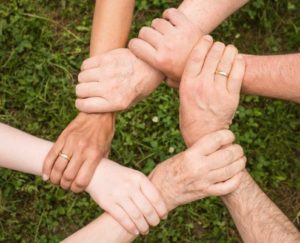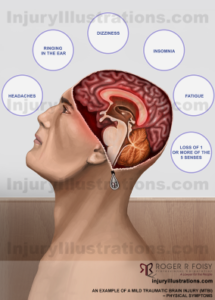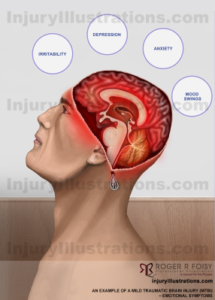Suffering an mTBI can be a life altering event for a person, disrupting their day-to-day routines and leaving them feeling scared, vulnerable, and confused. It is important to remember, however, that the effects go beyond the individual—changing the lives of close family members who in many cases are the first line of support.
In this article, I look at how an mTBI diagnosis impacts the family, paying particular attention to those closest to the injured individual who play an instrumental role in the recovery process.
Understanding the Impact of an mTBI on the Individual
A traumatic brain injury is any physical injury to the brain that causes a disruption of normal functioning. Although 70-90% of all traumatic brain injuries are classified as mild, that does not mean they are not serious. The reality is that any injury that upsets your brain’s normal functioning, even if it is only temporary, needs to be taken very seriously.
mTBIs do not discriminate based on factors like a person’s age, sex, or overall health. They can impact anyone, whether a slip and fall resulting in a head injury or an adult who suffers a whiplash injury during a motor vehicle accident.
Symptoms of an mTBI are commonly broken down into three categories—physical, cognitive, and emotional—and include:
- Physical: Headaches, ringing in the ear, dizziness, insomnia, fatigue, and the loss of one or more of the five senses.
- Cognitive: Attention, concentration, memory, information processing, reasoning, and planning.
- Emotional: Irritability, depression, anxiety, and mood swings.
Remember that, because each individual and injury is unique, no two mTBIs will be alike. One person might display more physical symptoms, another more emotional, and another more cognitive. Sometimes symptoms present suddenly, while in other cases they may not appear for weeks afterwards. Understanding the effects an mTBI has on the specific person will lead to better treatment and support.
The Role of the Family in Supporting the Individual
Watching a loved one suffer with an mTBI and supporting them as they recover can be a difficult experience for a family. When one person in a household experiences an mTBI, everyone feels it.
 It is not uncommon for those close to the affected individual to struggle with emotions like denial, sadness, anger, frustration, and guilt. You need to be patient with yourself and understand that these feelings are normal responses to what can be significant life changes. To learn more about common emotional responses and how to cope with them, I invite you to read my earlier article on this subject.
It is not uncommon for those close to the affected individual to struggle with emotions like denial, sadness, anger, frustration, and guilt. You need to be patient with yourself and understand that these feelings are normal responses to what can be significant life changes. To learn more about common emotional responses and how to cope with them, I invite you to read my earlier article on this subject.
In the days and weeks that follow an mTBI event and diagnosis, family members often find themselves providing two types of support:
- Attendant Care: This kind of assistance is often more supervisory in nature and includes duties such as making sure individuals do not leave appliances like stoves and ovens turned on and that they take their medications as required. Depending on how their symptoms manifest, some individuals might require physical help to stand up or walk between rooms, though these needs tend to prevail earlier on, usually due to dizziness, and be short lived.
- Caregiving and Emotional Support: This is the emotional piece and can be more drawn out as those impacted grapple with the long-term effects of an mTBI. At this stage, individuals suffering from an mTBI might be more prone to lashing out at those closest to them and acting irritably as a response to feelings of anger, frustration, and depression. Being there for the individual reminds them that together you will get through this challenging period.
 One of the most important things to emphasize is that family members looking after a loved one with an mTBI also need to make sure they are looking after themselves. This is a problem I have seen firsthand especially in situations where the symptoms are more severe and long lasting. Parents, for example, can become so invested in their children getting better that they do not see the effect their son or daughter’s injury is having on them.
One of the most important things to emphasize is that family members looking after a loved one with an mTBI also need to make sure they are looking after themselves. This is a problem I have seen firsthand especially in situations where the symptoms are more severe and long lasting. Parents, for example, can become so invested in their children getting better that they do not see the effect their son or daughter’s injury is having on them.
As much as you would like to be there, you simply cannot be present 24/7. Watch out for each other as a family and, if you feel one member is pushing themselves too much, encourage them to take a personal respite so they can rest and recharge.
Aiding Your Family in the Aftermath of an mTBI Diagnosis
The Ontario Brain Injury Association (OBIA) is a good resource for individuals and their loved ones suffering from an mTBI. In addition to providing information for people in Ontario who are living with brain injuries, the OBIA also has a helpline (1-800-263-5404) to provide caring and compassionate support.
Roger R. Foisy is an experienced Personal Injury Lawyer in Ontario who has helped clients with brain injuries receive compensation. If you or a loved one has suffered a brain injury, please contact us for immediate support and a free consultation.
*Roger R. Foisy has completed courses in Neurorehabilitation, Neurobehavioral Disorders, Advanced Brain Injury Rehabilitation, Cognitive Interventions for Adults with Acquired Brain Injuries, and Neuropsychological Assessments: Beyond Testing from Brock University. However, he is not a medical professional. The advice in this blog is not intended as a substitute for medical advice.
More on Brain Injury from Roger R. Foisy:




